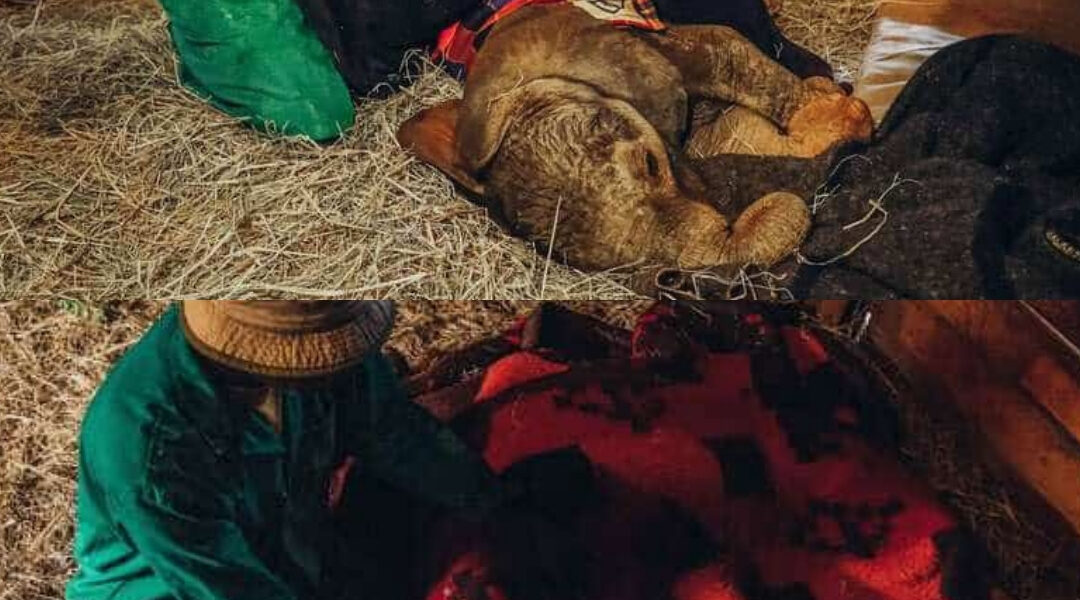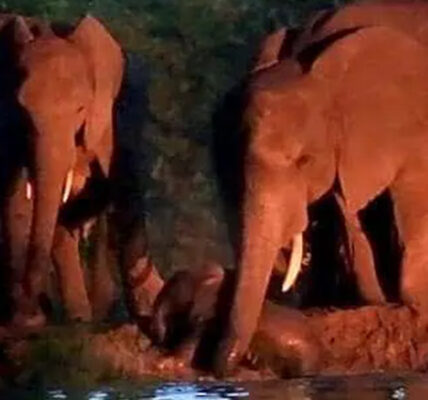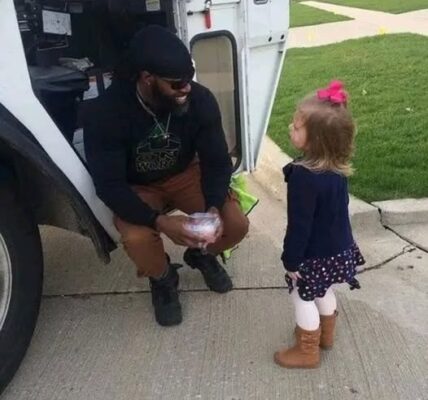When the sun dips behind the acacia trees and the last visitors leave the David Sheldrick Wildlife Trust, the sanctuary does not fall silent — it exhales. The sounds of the savanna soften into a lullaby: rustling leaves, chirping insects, and the gentle sighs of elephants settling into sleep.

Inside the nursery’s dimly lit stables, rows of baby elephants — some only months old — curl up beneath thick blankets. Their ears twitch, their trunks flop over the edge of their bedding, and the day’s energy melts into soft rumbling snores. But they are not alone.
In each stall, beside every calf, lies a human companion.

These are the keepers — men who have dedicated their lives to raising orphaned elephants as their own. Each one stays beside their elephant through the night, sleeping on small bunks or mattresses nearby. When the babies stir or cry out for milk, it is these caretakers who rise without hesitation, preparing bottles of warm formula in the dark.
“It feels like having my babies in the same room,” one keeper told The Dodo. “It reminds me of when my own children were infants — waking up at all hours to feed and comfort them.”

For them, sleep comes in fragments — two or three hours at a time between feedings. The youngest calves need milk every three hours, and when they’re hungry, they make sure their keepers know. “The little ones are very restless, just like human babies,” one man laughed. “You’ll feel a trunk tug at your blanket or brush against your face — that’s how they wake you.”
In the early years of the Trust, the keepers slept right on the hay beside the elephants. “Sometimes you’d wake up with your blanket gone, or a curious trunk tickling your ear,” another recalled. “Once, I opened my eyes and found dung inches from my face. I learned to move fast after that!”

But even in those moments of chaos, there is tenderness. Each interaction, each nightly feeding, strengthens the bond between elephant and human — a bond rooted in love, patience, and grief.
Most of these calves have lost their mothers violently — to poaching, drought, or falling into wells. Some arrive malnourished, trembling from fear and loneliness. For them, the keepers are not just guardians. They are family.

“You’re like a mother to them,” said one caretaker softly. “They need to know someone is there. Your voice, your scent, your presence — that’s what lets them sleep peacefully. That’s what helps them survive.”
As the night deepens, the nursery glows with soft lamplight.

The air is thick with the scent of hay and milk. Every few minutes, a low rumble echoes — an elephant dreaming. The calves sometimes snore, sometimes trumpet softly in their sleep. A few kick their legs as if running through an imagined field.
“They dream,” one keeper said. “You can tell. They twitch, they rumble, they move. Maybe they see their mothers again in those dreams.”
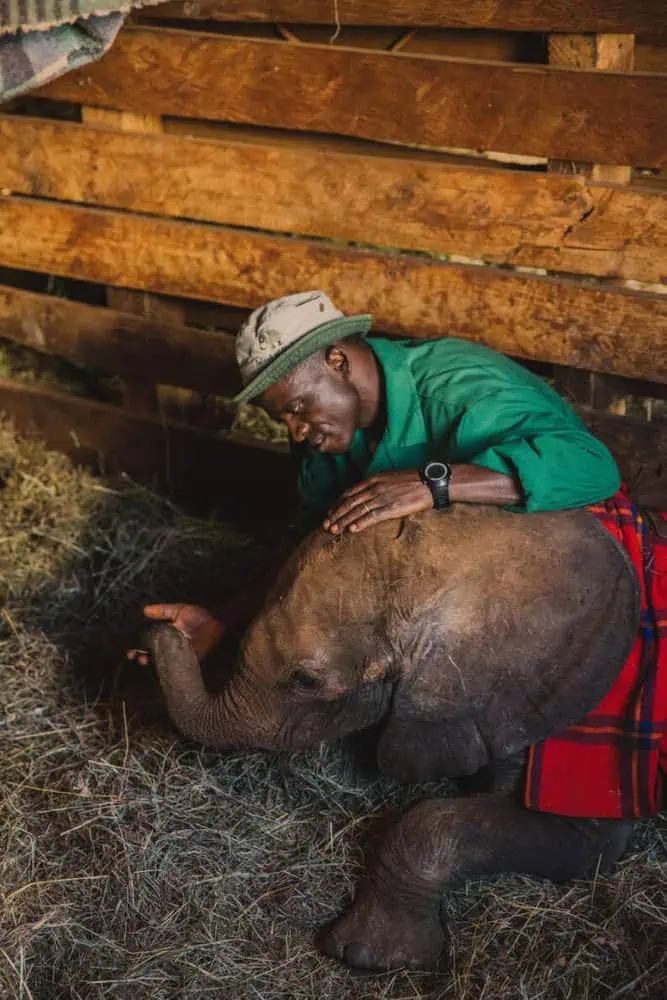
When the air turns cold, the keepers pull warm blankets over the elephants’ backs, gently tucking them in. Some whisper to them in Swahili or sing softly, the melodies blending with the rhythm of breathing. It’s a sight few outsiders ever witness — grown men, hardened by loss and long nights, cradling the world’s largest land mammals like children.
And it is precisely that — this devotion, this daily act of love — that has helped hundreds of orphaned elephants grow strong enough to one day return to the wild.
By dawn, the keepers are already preparing the first feedings. The nursery comes alive again — bottles clinking, water splashing, soft trumpets echoing through the morning light.

The elephants, full of energy, nudge their keepers playfully, wrapping trunks around arms and shoulders in a show of affection that transcends species.
“It’s exhausting,” one man admitted with a smile, “but when you see them grow — when you see a calf that almost didn’t make it running free again — it’s worth every sleepless night.”
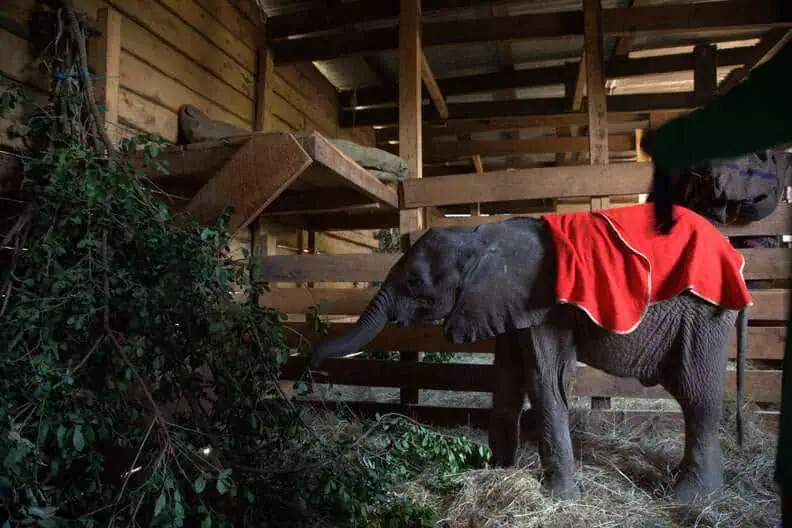
Many of these keepers have spent decades doing this work, forming lifelong bonds with elephants that once fit under their arms but now tower over them. And yet, when those elephants are released back into the wild, they never forget. Years later, some of them return — walking for miles to find their human family.
One keeper recalled a reunion that left him speechless. “I called out her name,” he said, “and she turned, flapped her ears, and came running. She remembered me. After all that time.”

For these men, the nights are long, the labor endless. But as they rest beside the gentle rumble of sleeping elephants, they know they are part of something bigger — a cycle of love and trust that bridges the wild and the human heart.
In the quiet hours before dawn, when the world is still and the stars hang heavy over Nairobi, the keepers whisper their silent promises: Sleep, little one. You are safe.
And somewhere in the dark, a small trunk reaches out, searching — and finds a hand waiting there.

